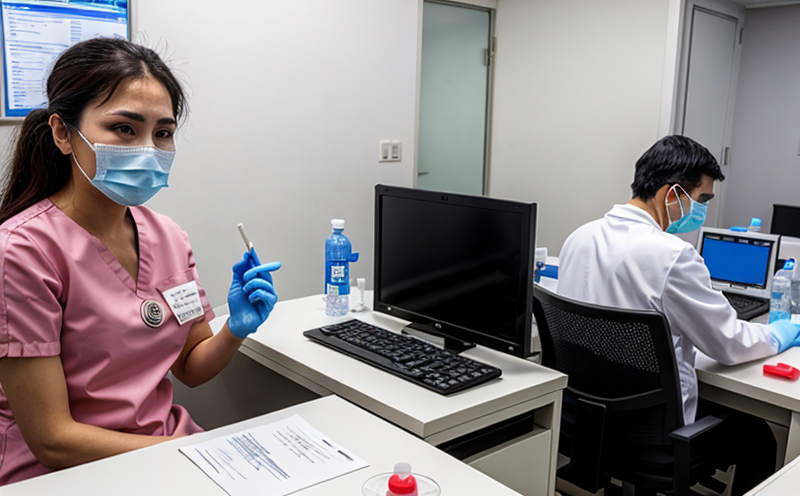Avian Leukosis Virus Antigen Testing in Chickens
The Avian Leukosis Virus (ALV) antigen testing is a critical diagnostic tool for poultry farmers, quality managers, and veterinarians to identify infected chickens early on. This test plays an instrumental role in preventing the spread of ALV within chicken flocks, which can lead to significant economic losses due to decreased egg production, increased mortality rates, and compromised bird health.
ALV belongs to the retrovirus family and is known for its ability to integrate into avian genomes. The virus has several subtypes (ALV-J, ALV-A, etc.), but the presence of any subtype can compromise flock health. Testing for ALV antigens helps in early detection, thereby enabling timely intervention strategies such as culling or quarantine.
The test procedure involves collecting blood serum samples from birds and then performing a rapid antigen detection test using monoclonal antibodies specific to ALV antigens. This method is highly sensitive and can detect even low levels of viral proteins in the host, making it an effective screening tool for disease management.
Once the samples are collected, they undergo rigorous processing steps including centrifugation to separate serum from blood cells. The processed sera are then tested using a lateral flow assay or ELISA (Enzyme-Linked Immunosorbent Assay) technique. Both methods are rapid and provide results within minutes to hours, depending on the equipment used.
It is essential to note that while these tests can detect ALV antigens, they do not differentiate between live and non-viable viruses. Therefore, further confirmatory testing using PCR (Polymerase Chain Reaction) might be required for definitive diagnosis of active viral infection.
- Sample Preparation: Proper handling and processing are crucial to ensure accurate test results. Samples must be collected aseptically and processed promptly to avoid degradation or contamination.
- Sensitivity Levels: Modern tests can detect as low as 0.1 ng/mL of ALV antigen, making them highly sensitive for early detection.
The importance of this test extends beyond just disease management; it also contributes significantly to enhancing biosecurity measures in poultry farms by providing a clear picture of the viral load present within the flock. Early intervention can prevent large-scale outbreaks and maintain optimal production levels, ensuring profitability for farmers.
In summary, ALV antigen testing is an indispensable tool in avian health management, offering quick insights into potential threats posed by this retrovirus. By integrating such tests into routine poultry farming practices, stakeholders can significantly improve flock health and productivity, ultimately leading to sustainable agricultural practices.
Benefits
The benefits of implementing ALV antigen testing in chicken populations are manifold. Early detection allows for proactive management strategies that minimize the spread of disease within flocks, thereby reducing economic losses associated with reduced egg production and increased mortality rates.
- Enhanced Biosecurity: Regular testing helps maintain strict biosecurity protocols by identifying infected birds early, which can then be isolated or culled to prevent further contamination.
- Economic Efficiency: By preventing large-scale outbreaks, ALV antigen testing supports sustainable egg production and reduces the need for costly treatments later on.
- Improved Animal Welfare: Detecting and addressing health issues promptly leads to better overall welfare of poultry, reducing stress and suffering among infected birds.
In addition to these immediate benefits, consistent implementation of ALV antigen testing contributes positively towards long-term sustainability goals in the agricultural sector. It fosters a culture of responsible farming practices that prioritize both economic viability and animal health.
International Acceptance and Recognition
The standard for conducting ALV antigen tests is outlined in ISO standards, particularly focusing on the use of appropriate reagents and equipment. These guidelines ensure consistency across different laboratories worldwide, facilitating international trade and collaboration.
ALV antigen testing is widely accepted by regulatory bodies such as the World Organization for Animal Health (OIE) and the European Union (EU). Compliance with these standards not only ensures accuracy but also enables seamless export of poultry products to markets that have stringent import regulations regarding avian health.
Many countries, especially those involved in international trade, require proof of ALV antigen testing results as part of their certification processes. This requirement underscores the importance of accurate and reliable testing methods recognized globally.
Competitive Advantage and Market Impact
- Precision: Leading laboratories offering ALV antigen tests provide precision in diagnostics, which is crucial for maintaining high standards of poultry health. This precision translates into a competitive edge by ensuring that only the most reliable results are reported.
- Rapid Turnaround Time: Efficient testing processes reduce downtime for farms, allowing them to resume normal operations quickly after identifying infected birds.
- Compliance Assurance: By adhering strictly to ISO and OIE guidelines, these laboratories ensure that their services meet all necessary regulatory requirements, thereby building trust among clients and partners.
The ability to offer high-quality ALV antigen tests not only enhances the reputation of a laboratory but also opens up opportunities for expansion into international markets. In an increasingly globalized agricultural industry, being able to provide services that are both accurate and compliant with international standards positions laboratories favorably against competitors.





